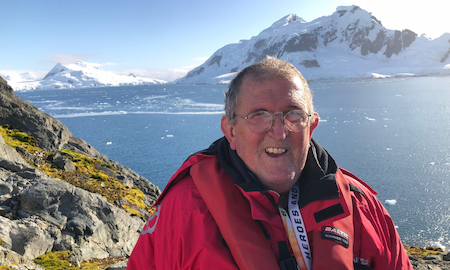Blood cancer doesn’t stop: Paul’s story
After defying the odds with blood cancer Paul Cronin has also faced the life-threatening coronavirus at the centre of the global pandemic.

The 62-year-old was diagnosed with a blood cancer called myeloma in February 2015, after five months of tests and uncertainty.
Super survivor Paul is thought to be one of the first Australians with myeloma to conquer COVID-19.
Myeloma is a cancer of the cells used by your immune system. It develops in your bone marrow and stops your blood from being made properly. The exact cause of myeloma is unknown. It can be managed with treatment but is incurable.
“I have the aggressive myeloma gene with an average life expectancy of two years,” explained Paul.
“I started chemotherapy straight away and had a stem cell transplant six months later.
“I nearly died twice in that time with fevers near 40 degrees.”
Paul now maintains his health with a life-saving combination of drugs and therapies.
“I’ve made it to a little over five years now and my haematologist said if I got to 10, it’d be a miracle,” added Paul.
COVID-19 diagnosis
Paul has not let his disease hold him back and has travelled extensively.
He was on his way back from a trip to Antarctica, travelling through South America, when he first heard of the global coronavirus pandemic.
“We had basically been off the grid since we left for the trip at the end of February,” Paul said.
“We arrived back to Ushuaia in South America a few weeks later from Antarctica and people were saying ‘Everything has started to shut down and the borders are closing’.
“A few days later it became clear I needed to get home. If I had been stuck there I probably wouldn’t have lived.”
A cancelled flight, five stopovers, four days and $3,500 later Paul finally made it home to Adelaide.
“There was a lot of people coughing and spluttering at the airport and on the planes,” said Paul. “We had masks, but not the professional ones.
“A couple of days later I woke up lethargic and had trouble breathing. I couldn’t get any air into my lungs no matter what I did,” said Paul.
“I went to the hospital and they took the swab. Twenty-four hours later I was told I had tested positive for COVID-19.”
Self isolation with blood cancer
Paul’s wife, Kathryn, and 23-year old son, Daniel, had already moved out with friends for two weeks. And Paul had already put himself into the state’s compulsory 14-day quarantine at home as a precaution.
Kathryn rang Paul’s haematologist who arranged an ambulance, which took him to hospital. He was immediately put into isolation.
Paul was kept in hospital for 19 days, spending two days in intensive care.
“From what I was told, I was the first person in South Australia with both COVID-19 and myeloma,” Paul said.
“I was very sick, lost around 13 kilograms and I was pretty close to death’s door.
“The time in total isolation was tough. Only the doctors and nurses in gowns and masks could come in my room.
“Thank god I had a phone because I wasn’t able to see anyone else during that time.”
Recovering from coronavirus
Paul had two negative coronavirus tests before being discharged from hospital in mid-April and is now focused on slowly rebuilding his strength.
“During the first two weeks at home, I was still crook, very weak and couldn’t do much. But now I’m starting to walk again,” said Paul.
“I am now back on my myeloma maintenance protocol with regular blood tests.
“The coronavirus has affected my lungs, which we knew was one of the side effects. My breathing has got worse but I’m managing.
“It’s also affected my liver so I will be having regular ultrasounds to check on that and I’m keeping an eye on my weight as well.”
#yourstorycounts
Share your story of living with blood cancer in the COVID-19 crisis.
Tell us how the outbreak has impacted your every-day life and how the Australian community can best support you through this uncertain time.
Also share your message of support for other blood cancer families and advice for keeping safe during the outbreak.
We may then share on this page for our blood cancer community.
Email storyhub@www.leukaemia.org.au with your story.
Last updated on May 24th, 2024
Developed by the Leukaemia Foundation in consultation with people living with a blood cancer, Leukaemia Foundation support staff, haematology nursing staff and/or Australian clinical haematologists. This content is provided for information purposes only and we urge you to always seek advice from a registered health care professional for diagnosis, treatment and answers to your medical questions, including the suitability of a particular therapy, service, product or treatment in your circumstances. The Leukaemia Foundation shall not bear any liability for any person relying on the materials contained on this website.